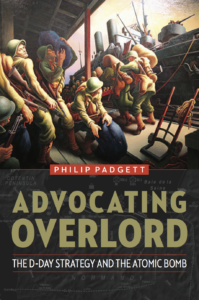Advocating OVERLORD: The D-Day Strategy and the Atomic Bomb
 Available: NOW Hardcover, Paperback and E-book
Available: NOW Hardcover, Paperback and E-book
Publisher: Potomac Books
Language: English
ISBN-10: 1612349625
ISBN-13: 978-1612349626
“Well, there it is. It won’t work, but you must bloody well make it,” said the chief of Britain’s military leaders in March 1943, when he ordered the start of planning for what became known as Operation Overlord. So challenged by as much skepticism as support from top leaders, and with little to build on, a tight knit Allied team, COSSAC, did develop a viable plan to liberate Europe from the west. It would begin with a cross-Channel assault in 1944, D-Day. Winning Anglo-American approval in 1943 for the Overlord plan was harder still – and did not happen in a vacuum.
Simultaneously, the two countries also were talking through a crisis in World War II’s other great secret, whether to repair a rupture in their cooperation to develop an atomic bomb. Only a few at the very top had the “need to know” that not one, but two separate negotiations were under way. From January1943, month by month, the two negotiations came into ever closer proximity. Did Churchill signal in May and Roosevelt press in August for a quid pro quo, the Prime Minister’s acceptance of Overlord for the President’s reopening of the Manhattan Project to the British? Those two decisions, one after the other by only hours, were a seminal outcome of the August 1943 Quadrant Conference. Advocating Overlord argues that they, indeed, were the components of a quid pro quo.
Within days, even before their American counterparts knew of FDR’s action, British atomic scientists showed up in the United States ready to go to work. Just as quickly, ships sailed from the United States, beginning an eight-month surge of over one million troops to Britain. Thus, the core force to execute D-Day was set in place as a new fact on the ground that made irreversible the Allied commitment to Overlord.
Throughout 1943, battlefield events gave context to the negotiations, particularly in the Battle of the Atlantic and in the skies over Europe. Axis U-boat operations and the Allies Combined Bomber Offensive were alike in that they were both campaigns of attrition which would fail to achieve their primary goals. Advocating Overlord examines how each influenced liberation strategy negotiations.
But why has the story of coming to Anglo-American agreement on liberation strategy not considered paralleling atomic negotiation before now? The answer may rest in the pace of declassification of the Allies’ most sensitive secrets. By 1975, when the diplomatic history of the Manhattan Project was declassified, the arc of the story of the Allies’ military strategy negotiations already had been set by earlier, security conscious official histories and the memoirs of the principals who, by 1975, had gone on to their reward. The irresistible drama of the near collapse of discussions between military leaders in May 1943, as an example, leaves understandable the overlooking of concurrent atomic discussions at the White House only seven blocks away. Yet, the outcome of both would be taken to Roosevelt and Churchill who would talk further.
Neither the military strategy negotiation that set the path to the liberation of Europe nor the atomic cooperation that began the era of nuclear anxiety which persists can be understood completely without examining both together. Advocating Overlord is the first book-length account of their 1943 concurrency and the probable linkage of these two endeavors.
The book is based on eight years of research and site visits in the United States, Canada, Britain, and France. Hundreds of primary documents were studied in archives and libraries. Advocating Overlord owes a particular debt to the ground-breaking, peer-reviewed 1976 paper of Dr. Brian Loring Villa on Normandy and the atomic bomb. Helpful with new insights, also, were the recently published works of historians from many countries written with benefit from further declassification but, also, written freer from the national biases that burdened generations closer to the trauma of the war.




